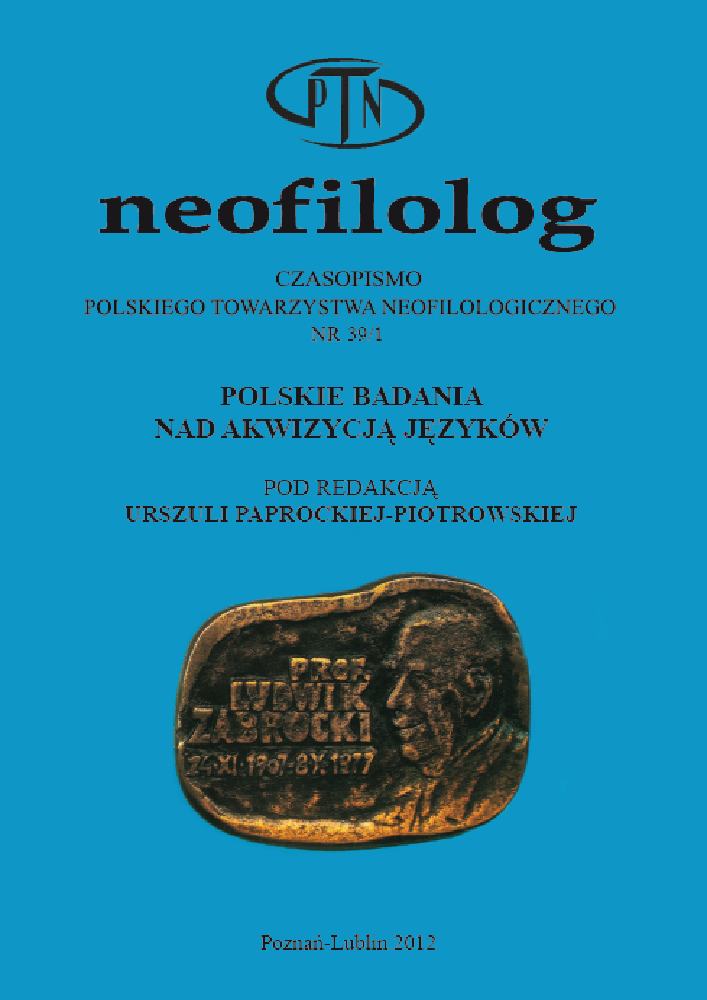Abstrakt
The article discusses the issue of collaborative writing during classes of academic writing for advanced students of English as a foreign language. It describes a research project in which the influence of collaborative planning on the quality of written discourse was analysed. The research found that essays based on the plan constructed by students in pairs were better in terms of organisation, linguistic variety, content and accuracy than essays written by these participants individually. Moreover, the questionnaires written by the participants revealed their positive attitude to collaborative essay planning.
Bibliografia
Cheng, Y.-S. 2004. „A measure of second language writing anxiety: Scale development and Comprehensible Input”. Applied Linguistics 4: 126-141.
Dobao, A.F. 2012 „Collaborative writing tasks in the L2 classroom: Comparing group, pair, and individual work”. Journal of Second Language Writing 21(1): 40-58.
Kim, Y. 2008. „The contribution of collaborative and individual tasks to the acquisition of L2 vocabulary”. The Modern Language Journal 92: 114-130.
Kintsch, W., van Dijk, T. A. 1978. „Toward a model of text comprehension and production”. Psychological Review 85/5: 363-394.
Kuiken, F., Vedder, I. 2002a. „The effect of interaction in acquiring the grammar of a second language”. International Journal of Educational Research 37: 343-358.
Kuiken, F., Vedder, I. 2002b. „Collaborative writing in L2: The effect of group interaction on text quality” (w) New directions for research in L2 writing (red. G. Rijlaarsdam, Ransdell, S. i M. Barbier). Dordrecht: Kluwer Academic Publishers: 168-187.
Long, M. 1983: „Native Speaker/Non-native Speaker Conversation and the Negotiation of preliminary validation”. Journal of Second Language Writing 13: 313-335.
Shehadeh, A. 2011. „Effects and student perceptions of collaborative writing in L2”. Journal of Second Language Writing 20(4): 286-305.
Storch, N. 2005. „Collaborative writing: Product, process and students’ reflections”. Journal of Second Language Writing 14(3): 153-173.
Storch, N., Wigglesworth, G. 2007. „Writing tasks: Comparing individual and collaborative writing” (w) Investigating tasks in formal language learning (red. M.P. Garcia Mayo). London: Multilingual Matters: 157-177.
Storch, N., Wigglesworth, G. 2010. „Learners’ processing, uptake, and retention of corrective feedback on writing”. Studies in Second Language Acquisition 32: 303-334.
Swain, M. (1999). „Integrating language and content teaching through collaborative tasks” (w) Language teaching: New insights for the language teacher (red. W.A. Renandya i C.S. Ward). Singapore: Regional Language Centre: 125-147.
Swain, M. 2006. „Languaging, agency and collaboration in advanced language proficiency” (w) Advanced language learning: The contribution of Halliday and Vygotsky (red. H. Byrnes). London: Continuum: 95-108.
Vygotsky, L.S. 1978. Mind in society. The development of higher psychological processes.
Cambridge, Mass: Harvard University Press.
Licencja
Prawa autorskie (c) 2012 Małgorzata Marzec-Stawiarska

Utwór dostępny jest na licencji Creative Commons Uznanie autorstwa – Bez utworów zależnych 4.0 Międzynarodowe.
Przedstawiany utwór (artykuł) upubliczniany jest na podstawie umowy z autorem i na licencji Creative Commons Attribution-NoDerivatives 4.0 International (CC BY-ND 4.0).
Użytkownicy mają obowiązek podania wraz z rozpowszechnionym utworem, informacji o autorstwie, tytule, źródle (odnośniki do oryginalnego utworu, DOI) oraz samej licencji;
- bez tworzenia utworów zależnych,
- utwór musi być zachowany w oryginalnej postaci.
Uniwersytet im. Adama Mickiewicza w Poznaniu zachowuje prawo do czasopisma jako całości (układ, forma graficzna, tytuł, projekt okładki, logo itp.).
